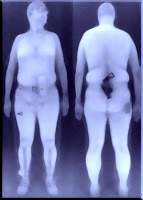The ACLU or American Civil Liberties Union's stance on the subject is that they should be used but only if a person is a "security risk". They say that, "Passengers expect privacy underneath their clothing and should not be required to display highly personal details of their bodies such as evidence of mastectomies, colostomy appliances, penile implants, catheter tubes and the size of their breasts or genitals as a pre-requisite to boarding a plane." Personally I see where they are coming from. But how do you characterize someone as being a higher security risk?
This idea comes down to what we have been talking in class: can an individual's right be restricted for the safety of the country? But then we have to answer the question, is it our right to refuse a body scan?
I would have to say no. Personally I think that in this case it is safer for the whole for body scanners to be used. People feel violated because they think that the person running the machine are looking at them naked. Not true. The images are only seen in rooms far away from the scanner and the images aren't kept and cannot be leaked. I think that it is a little self centered to think that your body is so amazing or has something about it that would set it apart from the other 1000 people who would go through that scanner that day. I realize that the thought of someone seeing a naked picture of you seems kind of scary/creepy but I think that in these "perilous times" we are just going to need to get over it. I'd rather go through body scanner that have a plane blow up.











